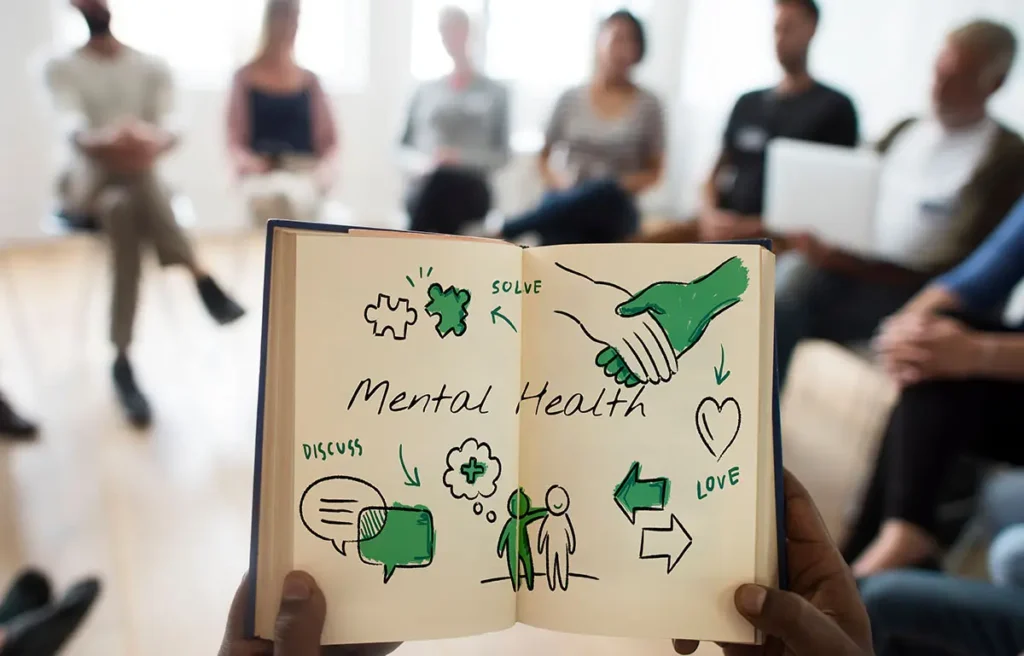A wide range of mental health issues causes illnesses that impact your emotions, thoughts, and behavior. And is directly related to mental illness, often known as mental health disorders. Anxiety disorders, eating disorders, schizophrenia, depression, and addictive behaviors are a few examples of mental illnesses.
What is Mental Health?

Mental health is defined by medical practitioners as the psychological, emotional, and social well-being of an individual. It encompasses more than just the absence of mental disease.
But also the capacity to navigate life’s challenges. It builds wholesome relationships and bounces back from setbacks.
Anyone can experience brief mental health issues that go away on their own without a formal diagnosis or course of treatment. Ongoing care and treatment are necessary for certain individuals. With long-term or chronic mental health illnesses to preserve their physical, social, and emotional well-being.
Medication and psychotherapy are often administered in conjunction with individuals with mental health issues. These therapies can have a big impact by helping people come up with plans. Need to enhance their general well-being and properly take care of their mental health.
Factors That Affect Your Mental Health

Mental health issues are influenced by a complex interplay of factors. Understanding these elements can assist individuals in seeking appropriate. It helps them adopt a healthier lifestyle to improve their well-being.
- Life Experiences: Trauma and abuse can have long-term effects on mental health.
- Biological Factors: These include genetic predispositions and brain chemistry, which can predispose people to mental health issues.
- Family History: Having a family history of mental health issues increases the risk of developing similar conditions.
- Lifestyle Choices: Poor eating habits, lack of physical activity, and use of alcohol, tobacco, or other substances can all lead to poor mental health.
- Environmental/Experiential Factors: Stressful work environments and a lack of social support can both hurt mental health.
- Age-Specific Challenges: Each stage of life, from adolescence to old age, brings with it its own set of mental health challenges, such as isolation or declining physical health.
FMRC’s Approach to Mental Health Issues

At FMRC, we value providing mental healthcare with a patient-centered approach. And making sure that every person receives therapy that is tailored to their specific needs.
Our team of highly qualified mental health specialists. Which includes counselors, psychologists, and psychiatrists. These provide you with a wide range of treatments to assist patients on their path to recovery.
Services we are providing
- Therapy and Counseling: Offering both individual sessions and group sessions to help patients navigate life’s challenges and develop coping strategies.
- Medication Management: Providing careful monitoring of medications to ensure optimal treatment outcomes.
- Support Groups: Creating a safe space for patients to share experiences and find community support.
- Preventive Care: Offering education and resources to promote mental health awareness and prevent the onset of mental health disorders.
At FMRC, we are committed to providing compassionate and effective mental health services and care to help our patients lead fulfilling lives.
The Contribution of Primary Care in Mental Health
It is essential to use primary care to detect and treat mental health issues. Our primary care physicians at FMRC, in Goldsboro, NC, are here for you. They are qualified to identify the warning symptoms of mental health illnesses.
And, if necessary, to send patients to specialist treatment or offer early assistance. We handle patients’ physical and emotional health holistically by including mental health services in primary care.
Signs of Poor Mental Health
Signs of poor mental health can be varied and may manifest in different ways. Some common indicators include:
- alterations in thought, behavior, and sleep habits
- subpar work or academic performance
- Apathy is the belief that nothing is important
- body aches or pains that don’t seem to have a reason
- Having trouble doing everyday chores
- feeling numb, thinking suspiciously, and hearing voices
- Keeping oneself apart from others
- little or nonexistent energy
- Losing interest in past hobbies or pastimes Mood swings that damage relationships
- obsession with ideas that won’t leave your brain Disorientation or memory issues
- Feelings of hurting oneself or other people
- abnormally elevated emotions of anxiety, anger, or terror
- Taking drugs, smoking, or alcohol excessively
It is advised that you get in touch with your primary care physician Goldsboro, NC as soon as possible. If you are experiencing any of these symptoms. They may assist in ruling out other possible explanations for these symptoms. And point you in the direction of a mental health specialist.
Which would be the next stage of your recovery process. Crisis centers offer quick support and referrals to mental health specialists. To those who are in emotional distress or are contemplating suicide. Seven days a week, twenty-four hours a day, FMRC may be reached at no cost.
Why is Stress a Cause of Mental Health Issues?

An important factor in poor mental health is stress. It sets off the body’s “fight or flight” reaction, which is meant to help us get through difficult circumstances or handle emergencies. However, a lot of individuals are always in “fight or flight” mode because of money concerns, conflict at work, or challenging interpersonal connections.
The American Institute of Stress reports that pressure from the workplace, money worries, and health problems rank as the top three stressors in the country. A startling 94% of workers report having chronic stress at work.
Also, over 55% of Americans say they feel stressed out most of the time. Physical symptoms of stress might. It includes headaches that don’t go away, high blood pressure, eating too much, sleeplessness, bodily pains, and susceptibility to infections.
Manage Your Mental Health Issues with FMRC

A range of tactics are needed to manage your mental health, such as changing your lifestyle. It involves obtaining mental health therapy and using prescription medications for mental health conditions.
When it comes to managing symptoms, use all three tactics. It might be the most successful approach for those with mental or behavioral health disorders.
Mental Health Issues Therapy with FMRC

Couples counseling, talk therapy, and cognitive behavioral therapy. These are a few of the several types of mental health therapy. In contrast, some individuals may feel that medicine alone. It is adequate, many people may find that treatment alone is effective.
Still, managing mental health concerns. The best typically involves combining the two. For anyone seeking assistance. For resolving mental health difficulties, FMRC mental health services in Goldsboro, NC are available.
Transformation of Lifestyles

Lifestyle modifications can help alleviate mental health symptoms. And it stops them from getting worse, in addition to medicine and counseling. Mental well-being may be greatly improved.
Through forming healthy food and exercise habits. As well as by engaging in stress-reduction exercises like yoga and meditation.
FAQ’s
How can I improve my mental health at FMRC?
To enhance your mental health at FMRC, engage with our best mental health services, and adopt personalized self-care routines.
What does mental health mean?
Mental health refers to emotional, psychological, and social well-being that affects how people think, feel and act.
What is the prevention of mental health issues?
Preventing mental health issues at FMRC involves early intervention, community support, and access to quality mental health services.
Where can I find mental health services in Goldsboro, NC?
You can find mental health services in Goldsboro, NC, at local clinics like the FMRC Mental Health Clinic and through mental health agencies in the area.
Conclusion
To summarize, managing mental health is a multifaceted approach that combines prescription medications, mental health therapy, and lifestyle changes. Each person’s path to mental health is unique, and what works for one may not work for another.
Seeking professional help from mental health clinics in Goldsboro NC and being open to new approaches. These are critical to striking the right balance and improving your mental health. To discover what makes you feel your best, you must be committed.
You make an effort and sometimes experiment. FMRC is with you to help you cure these mental health issues, and there are resources and support available to help you. Being informed about your mental health can help. You live a balanced and happier life.















